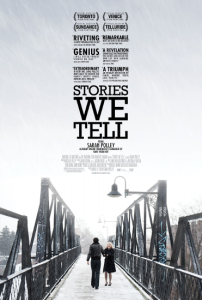 Sarah Polley uses a deeply personal story–the rumors surrounding her own lineage and conception–to explore how people choose to frame the narratives of their lives. Stories We Tell looks at different layers of connection to the parenthood rumors. It starts with Polley, the child at the center of the story. Then it jumps to her immediate family–father, brothers, and sister. Then it extends to her mother’s coworkers, friends, and acquaintances at the time of Sarah’s birth. The film quickly shifts focus spinning on individual discoveries, leading to a new round of questions for the people who shift in and out of the inner circle of the real history of Sarah’s birth.
Sarah Polley uses a deeply personal story–the rumors surrounding her own lineage and conception–to explore how people choose to frame the narratives of their lives. Stories We Tell looks at different layers of connection to the parenthood rumors. It starts with Polley, the child at the center of the story. Then it jumps to her immediate family–father, brothers, and sister. Then it extends to her mother’s coworkers, friends, and acquaintances at the time of Sarah’s birth. The film quickly shifts focus spinning on individual discoveries, leading to a new round of questions for the people who shift in and out of the inner circle of the real history of Sarah’s birth.
Stories We Tell is a documentary, albeit a very experimental one. For all of the traditional tools used (interviews, reenactments, voice overs, etc.), the structure is pure thriller. We’re dragged down the ever shifting sands of memory until Polley herself starts to lose track of the narrative. It evolves in such an organic (well, as organic as a thriller filled with misdirection and hidden secrets can be) way that the final moments are all the more revelatory. It doesn’t even matter that the mystery is solved by the halfway point; the initial search for truth was never the real point of the documentary.
It is unsettling to watch this story unfold. Everyone is so sure of their position, so positive that they know exactly what happened, that you begin to doubt everything you’ve been told. Polley constantly sets you up for surprises and failures. The biggest trick is declaring that this film’s real focus is on the identity of her father.
Stories We Tell has a genius angle for wider exposure. How many talk shows have had those incredibly trashy paternity test episodes where a woman brings out a possible father (or even fathers) of her young child? She declares that he’s 100% the father and she can prove it, while he denies it by pointing out who else it could be. The families are split but the show, without question, always points out how the man taking the paternity test looks just like the baby. The crowd cheers for the mother, jeers the could-be father, and screams like they’re on a rollercoaster when the host reveals the DNA test results. No matter what the result is, the crowd acts like they knew all along that the man was or was not the father. They’ve already rewritten the narrative based on the presentation of evidence even if 10 seconds before they knew the other person was right about the parentage.
 Sarah Polley knows that exploring the nature of personal narratives and the inability to find a definitive truth is a good subject for a documentary. It’s just hard to tell that story about how personal context reframes memory however you want to remember it without a juicy story to dig into. She could have done this documentary with a big historical event or a staged stunt at the grocery store. There just wouldn’t be that angle of voyeurism, of intrigue and long-hidden secrets, that makes this work.
Sarah Polley knows that exploring the nature of personal narratives and the inability to find a definitive truth is a good subject for a documentary. It’s just hard to tell that story about how personal context reframes memory however you want to remember it without a juicy story to dig into. She could have done this documentary with a big historical event or a staged stunt at the grocery store. There just wouldn’t be that angle of voyeurism, of intrigue and long-hidden secrets, that makes this work.
She stakes Stories We Tell on her own personal story. She interviewed people she has known her entire life and convinced her family and friends to open themselves up to scrutiny in the name of a documentary. The film constantly says that Polley didn’t know where she was going with the interviews while she filmed them, but that seems like the most manipulative claim of all. She’s recontexualizing her own plans on the fly to get her interview subjects to open up more. The safer she makes them feel, the more they open up about what they really remembered about her late mother’s life. The closeness to the narrative is what allows her to make a documentary about how we present our memories to the world so compelling.
The biggest problem is that Polley plays her cards so tight to her chest. The reveal of information is quite engaging, but the actual focus of the documentary doesn’t become clear for quite some time. The parentage question doesn’t come up until at least 20 minutes into the film. It’s not clear what, exactly, she’s going for until that point. Then the actual focus on the nature of personal storytelling drifts in only for the last act. Stories We Tell is quite focused on how the story is told, but the message is far less obvious.
Rating: 7/10
Thoughts? Share them below.
